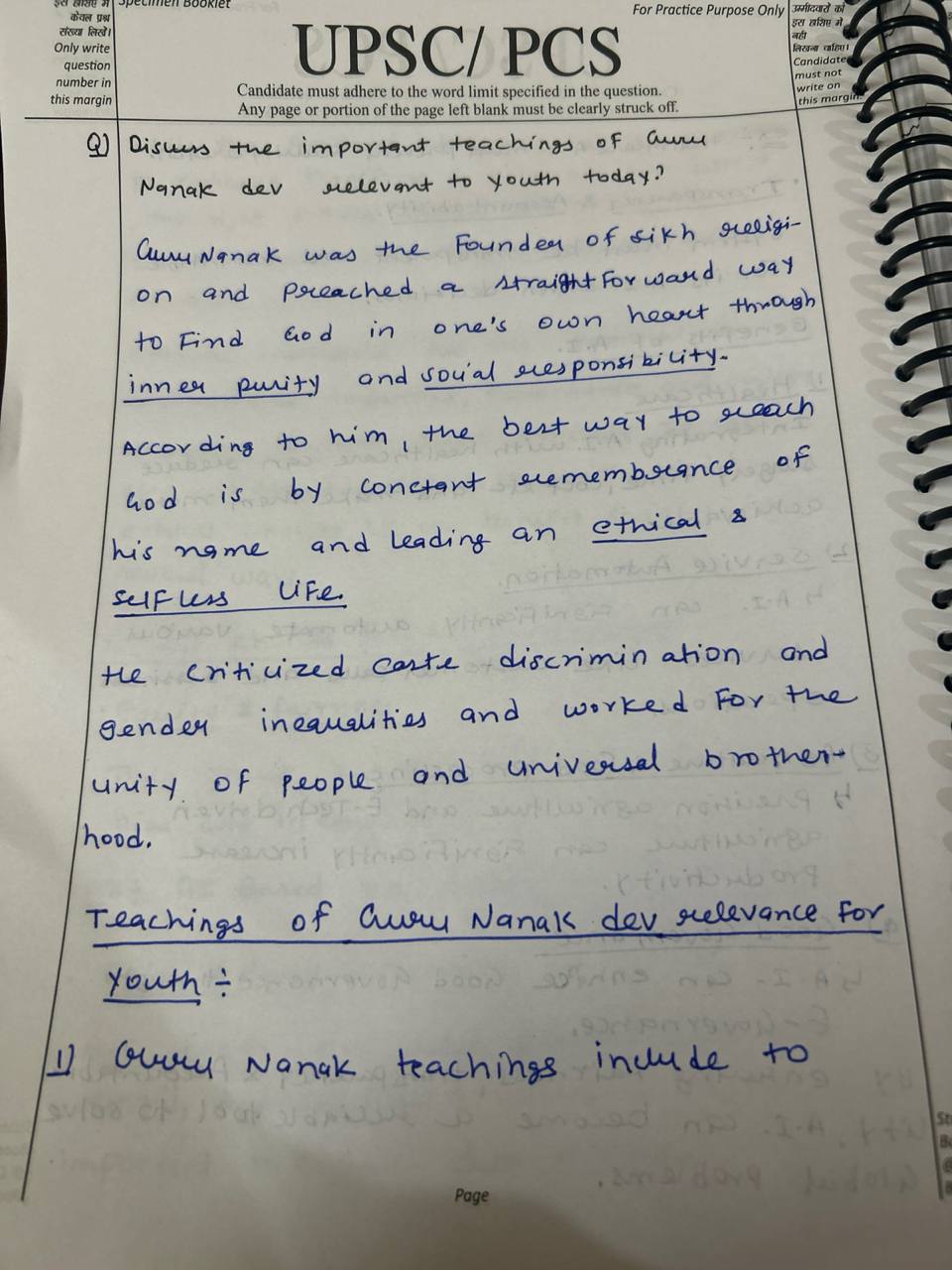What significance do you attach to each of the following quotations? “We may be members of different languages, religions, or skin tones, but we are all members of the same human race.” Kofi Annan (Answer in 150 words)
Ashoka, the Mauryan emperor, is renowned for his transformation from a ruthless conqueror to a benevolent ruler. This transformation of his is an inspiration for modern times as well. The Indian Republic's choice of Ashoka's Lion Capital at Sarnath as its state emblem reflects the resonance of his eRead more
Ashoka, the Mauryan emperor, is renowned for his transformation from a ruthless conqueror to a benevolent ruler. This transformation of his is an inspiration for modern times as well. The Indian Republic’s choice of Ashoka’s Lion Capital at Sarnath as its state emblem reflects the resonance of his ethical teachings in contemporary India. The Lion Capital at Sarnath, chosen as India’s national emblem, symbolizes the power of an enlightened emperor dedicated to upholding righteousness. By embracing this symbolism, modern India is committed to equality, socialjustice, and the triumph of truth.
Ethical teachings that find resonance in Ashoka’s Life:
- Self-transformation: One profound truth derived from Ashoka’s story is the remarkable ability to transform oneself and one’s ideals through self-reflection. It teaches individuals as well as organisations to cultivate self-awareness, reflect on their actions and take responsibility for their outcomes.
- Equality and justice: One of Ashoka’s remarkable achievements was the establishment of one of the earliest welfare states in the ancient world. Moreover, Ashoka’s concept of ‘Dhamma encompassed the principles of fairness, dignity and justice reflecting that the foremost aim of the State should be the well-being of its subjects.
- Tolerance and acceptance: Ashoka’s reign stands as a shining example of tolerance towards diverse faiths and dissenting viewpoints. His wisdom echoes the ongoing debates on free speech and tolerance, issues of inclusive growth as well as harmonious coexistence of different faiths.
- Diplomacy and peaceful coexistence: After conquering Kalinga, he established contact and maintained treaties with five contemporary Greek rulers. This early example of international negotiation to foster peaceful relations inspired India’s first Prime Minister, Jawaharlal Nehru, and subsequent policymakers to establish diplomacy-based ties with neighbouring countries.
- Compassion and empathy: Ashoka demonstrated the socio-moral virtues of honesty, truthfulness, compassion, mercifulness, benevolence, nonviolence, and considerate behaviour towards all including animals. Ashoka’s emphasis on animal rights holds relevance even today, emphasizing the importance of humane treatment and wildlife preservation worldwide.
- Humanity and humility: Ashoka showed humanity and humility by serving his people, establishing hospitals for humans and animals, providing medicines, planting trees, constructing wells and resting places, and taking action against public negligence and animal cruelty.
Ashoka’s life and deeds remain pertinent as India progresses toward a courageous, proud, and influential nation guided by the principle of ‘Satyamev Jayate’ (truth always triumphs).
See less


Kofi Annan was a Ghanaian diplomat who served as the seventh general secretary general of the united nation from 1997 to 2006. Annan likewise played a central role in the creation of the Global Fund to fight AIDS, Tuberculosis and Malaria, the adoption of the UN's first-ever counter-terrorism strateRead more
Kofi Annan was a Ghanaian diplomat who served as the seventh general secretary general of the united nation from 1997 to 2006. Annan likewise played a central role in the creation of the Global Fund to fight AIDS, Tuberculosis and Malaria, the adoption of the UN’s first-ever counter-terrorism strategy, and the acceptance by Member States of the “responsibility to protect” people from genocide, war crimes, ethnic cleansing and crimes against humanity. His “Global Compact” initiative, launched in 1999, has become the world’s largest effort to promote corporate social responsibility.
One of his famous quote of Annan is “We may have different religions, different languages, different colored skin, but we all belong to one human race” and it epitomizes peace, zero discrimination , love and many more. Discrimination thoughts come through ignorance and lack of love which would lead to disruption of peace in the society. Discrimination that individuals face on the basis of their age, gender, race, nationality, religion, sexual orientation, or disability.
At the heart of all forms of discrimination is prejudice based on concepts of identity, and the need to identify with a certain group. This can lead to division, hatred and even the dehumanization of other people because they have a different identity.
Results found that perceived racial and religious discrimination have unique and differential effects on depression and anxiety. When assessed concurrently, racial discrimination predicted depression and anxiety, religious discrimination predicted anxiety and racial discrimination predicted lower life satisfaction.
Qualitative research suggests that discrimination against minority groups precipitates terrorism in countries. This study adds to this body of research by determining which specific manifestations of minority discrimination—political, socioeconomic or cultural—are important and substantive predictors of terrorist activity. On a cross-national dataset of terrorist attacks and the treatment of minority groups in four specific areas: political participation and representation, economic status, religious and language rights. The results indicate that socioeconomic discrimination against minorities is the only consistently significant and highly substantive predictor of terrorism.
Accepting the difference
Accepting difference means understanding how we are alike, how we are different and treating everyone with respect and understanding regardless of the differences. We must learn to accept the difference , we are born different and that is not our fault, being rich or poor , our religious beliefs ,thought process, gender differences are neither a blessing nor our fault. Our thoughts is not our own, what we see and what we have learned brings thoughts. Our appearance is not due to our skill, somehow organs are placed in the correct position and we have nothing to do with it. How much ever rich we are, death is waiting for us. Whatever is our position after our death we may not be remembered by anyone. We should accept that we are born with nothing and die only with our values.
We must be willing to accept the difference , which will help us to be a better human being and the world become beautiful. If the world turns beautiful there is no need for hatred. Speak against sectarianism and fanaticism, and call for a harmonious coexistence of different faiths.
See less